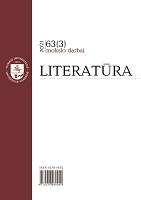Ričardas Mironas (1908–1979): sovietinio mokslininko karjeros profilis (archyvinių šaltinių apžvalga)
Career Profile of the Soviet Scholar: Ričardas Mironas (1908–1979)
Author(s): Nijolė JuchnevičienėSubject(s): Lithuanian Literature, Obituary, Philology
Published by: Vilniaus Universiteto Leidykla
Keywords: Ričardas Mironas; Classical philology; Vilnius University; Faculty of Philology; Department of Classics;
Summary/Abstract: The present article gives a survey of R. Mironas academic career based upon archive material kept in the Vilnius university library and in the Martynas Mažvydas National Library. R. Mironas’ egodocuments are published for the first time. They help to understand the contemporary situation in the institutions of high education and the constant ideological constraint felt by the academic staff. R. Mironas is the only one among the Lithuanian classicists whose name is rarely spoken, according to the dictum nil, nisi bene. It is not much written about him untill the present day, in spite of the fact that Mironas was one of of the most gifted and colourful personalities. He is regarded as one of the beginners of the Oriental studies in Lithuania. R. Mironas was born to an outstanding family; none of his colleagues could make a similar boast. After the Russian occupation he did not leave Lithuania like most of the Lithuanian intellectuals and in 1944 started teaching at Kaunas university. He made his choice to become a social climber from the very beginning of the occupation. He made a spectacular academic caree due to his ability to adapt to the ideological requirements and to easily change his creed on demand.The present article gives a survey of R. Mironas academic career based upon archive material kept in the Vilnius university library and in the Martynas Mažvydas National Library. R. Mironas’ egodocuments are published for the first time. They help to understand the contemporary situation in the institutions of high education and the constant ideological constraint felt by the academic staff.The present article gives a survey of R. Mironas academic career based upon archive material kept in the Vilnius university library and in the Martynas Mažvydas National Library. R. Mironas’ egodocuments are published for the first time. They help to understand the contemporary situation in the institutions of high education and the constant ideological constraint felt by the academic staff. R. Mironas is the only one among the Lithuanian classicists whose name is rarely spoken, according to the dictum nil, nisi bene. It is not much written about him untill the present day, in spite of the fact that Mironas was one of of the most gifted and colourful personalities. He is regarded as one of the beginners of the Oriental studies in Lithuania. R. Mironas was born to an outstanding family; none of his colleagues could make a similar boast. After the Russian occupation he did not leave Lithuania like most of the Lithuanian intellectuals and in 1944 started teaching at Kaunas university. He made his choice to become a social climber from the very beginning of the occupation. He made a spectacular academic caree due to his ability to adapt to the ideological requirements and to easily change his creed on demand.The present article gives a survey of R. Mironas academic career based upon archive material kept in the Vilnius university library and in the Martynas Mažvydas National Library. R. Mironas’ egodocuments are published for the first time. They help to understand the contemporary situation in the institutions of high education and the constant ideological constraint felt by the academic staff. R. Mironas is the only one among the Lithuanian classicists whose name is rarely spoken, according to the dictum nil, nisi bene. It is not much written about him untill the present day, in spite of the fact that Mironas was one of of the most gifted and colourful personalities. He is regarded as one of the beginners of the Oriental studies in Lithuania. R. Mironas was born to an outstanding family; none of his colleagues could make a similar boast. After the Russian occupation he did not leave Lithuania like most of the Lithuanian intellectuals and in 1944 started teaching at Kaunas university. He made his choice to become a social climber from the very beginning of the occupation. He made a spectacular academic caree due to his ability to adapt to the ideological requirements and to easily change his creed on demand.
Journal: Literatūra
- Issue Year: 63/2021
- Issue No: 3
- Page Range: 74-89
- Page Count: 16
- Language: Lithuanian

